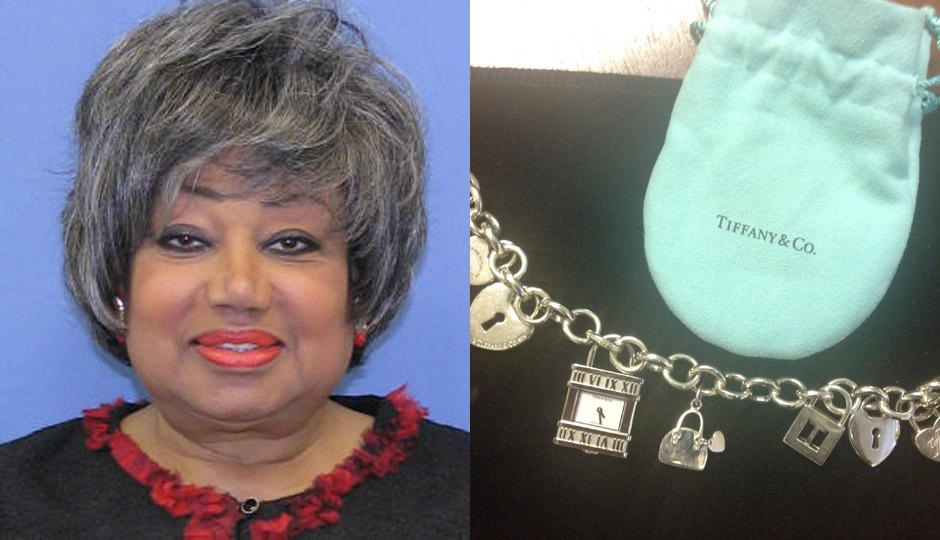The Tragedy of Thomasine Tynes

Thomasine Tynes, left. The bracelet she’s alleged to have accepted from a undercover confidential informant for the attorney general’s office.
As told in the media these last few months, the story of Thomasine Tynes — the former Traffic Court judge — is sordid indeed. She lied to a grand jury. She took the gift of an expensive bracelet after promising to help a young man make connections at the court. The court she served on no longer exists. Her name appears destined to go down as just one more entry in the annals of Philly civic corruption.
And all those things are true. But a sentencing memorandum prepared by her attorney, Louis Busico, offers another view of Tynes — telling the story of an African-American woman who had a hard upbringing and who rose to unexpected heights, only to have it all come crashing down. This story is a tragedy.
These sentencing memoranda are designed to elicit sympathy, of course, and thus should be taken with a grain of salt. But Busico’s memorandum (the full document is below) might make you reconsider your view of Tynes. Here are five notable passages from that memo:
Thomasine Tynes is seventy-one (71) years of age having been born on June 1, 1943. She was born to the marital union of Alice and Thomas Lynn. Thomasine’s twin brother died during childbirth and her mother died approximately three months thereafter. For the first seven years of her life, Thomasine was raised by her father and was subject to physical and mental abuse. Thomasine was repeatedly beaten by her father and berated because she, “the girl,” had lived when her twin brother, “the boy,” had died. After several years of constant abuse, Thomasine was taken from her father by her maternal grandmother, Maria Gardner. Thomasine was raised by her great grandparents and grandparents in North Philadelphia. By all accounts this was a loving environment as the family routinely ate meals together and attended religious services on Sunday.
Tynes grew to adulthood, graduating from Germantown High, but never graduating college.
In 1962, Thomasine married a Philadelphia County Detective, Richard A. Tynes. The couple was married at Our Lady of Victory Church in West Philadelphia. Unfortunately, Thomasine could not conceive children which made her husband both angry and unfaithful. Thomasine filed for divorce in 1986 and the divorce was ultimately finalized in 1991.
Tynes spent much of her career as a bookkeeper, then served as director of the Germantown House Senior Living Center. In 1989 she was — despite her lack of education — elected to the Traffic Court, where she was eventually elevated to the ceremonial post as president of the court. She served until 2012, receiving a number of awards and tons of positive press along the way. Toward the end of her tenure, two scandals emerged: One was an alleged ticket-fixing scheme at the court; the other involved Tyron Ali, an undercover informant for the Pennsylvania Attorney General’s Office.
This well-dressed, well-spoke con man asked Thomasine to introduce him to Administrative Judge Michael Sullivan. When Ms. Tynes agreed to do so, Tyron Ali, gave Thomasine a Tiffany charm bracelet as a “token of his appreciation.” There exists no issue that Ms. Tynes accepted this bracelet when she should not have done so. Upon reflection, she thought it best to report this gift to the President Judge of Philadelphia County, and she in fact did so. After confirming that the bracelet was real, Ms. Tynes obtained a cashier’s check from PNC Bank in the amount of $2,000.00 She obtained this check on November 16, 2011 and attempted to locate Tyron Ali. Because Mr. Ali was working as a confidential informant, Ms. Tynes was unable to locate him as he did not have a verifiable address and telephone number.
She was eventually charged by Philadelphia D.A. Seth Williams for accepting the bracelet. She agreed to plea, according to Busico’s memo, and offered testimony and other assistance in exchange for a lenient sentence. But that decision came with a cost:
Thomasine Tynes substantially assisted the Office of the Philadelphia District Attorney in the investigation and prosecution of corrupt politicians. The nature of her assistance consisted of meeting with law enforcement, participating in a proffer, and testifying before a grand jury. Her cooperation was most significant in that it permitted laww enforcement to file criminal charges against individuals who believed their political office was for sale. … While cooperating with the Office of the Philadelphia District Attorney did not necessarily place Ms. Tynes in physical danger, it did forever destroy and terminate longstanding relationships with individuals she believed were her friends.
Today, Busico writes, Tynes is beset by physical and mental ailments — and horrified that her journey up from humble beginnings has crashed so publicly.
Thomasine Tynes has led an extraordinary life overcoming the ravages of mental and physical abuse at a younge age; a lifetime of prejudice against against both her race and gender; myriad physical and mental health illnesses; and the treacherous world of Philadelpha politics. At the age of 71 she stands before this Court a humbled, embarrassed and ashamed citizen with a severely tarnished legacy. She feels an unbelievable amount of remorse for bringing shame to the Court, her robe and her person. But most especially, she cannot forgive herself for failing as a role model to the next generation of African-American women.
Thomasine Tynes is an adult who made the decisions that brought her to this point. But if Busico’s memo is to be believed, her story probably more sad than sordid.


